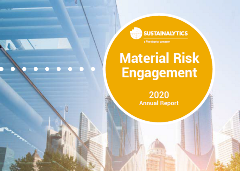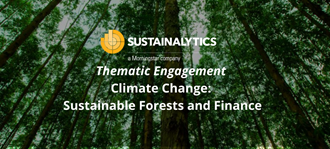Asia Pacific: Navigating the EU SFDR Regulations
The EU Action Plan raises the bar for transparency and accountability on sustainable finance and the investment management industry. Hear from Sustainalytics' Anne Schoemaker, Associate Director, Product Strategy and Development and William Ridout, Senior Product Manager, for an insightful event for Asia Pacific investors focusing on EU Taxonomy and Sustainable Finance Disclosure Regulation (SFDR).
New Draft Disclosure Rules Change Timelines and Scope of EU Taxonomy
In recent months, a lot has been said and written about the EU Taxonomy, the green classification system of economic activities that aims to drive capital flows to sustainable investments supporting the EU’s policy goals on climate and the environment. Political, corporate, and civil society lobbying reached its peak when the EU published draft rules last December, which deviated substantially from expert recommendations. However, the latest draft delegated act with rules on Taxonomy reporting published by the European Commission on May 7th has received far less attention even though some of the proposed changes affect the practical implementation timelines as well as the scope and ambition of the regulation.
Les points communs entre la réglementation française et européenne en matière d’ISR
Quand les nouvelles réglementations sur les investissements durables et responsables (ISR) furent annoncées avec le « EU Action Plan », les institutionnels français n'ont pas cillé. Depuis l'accord de Paris en 2015, de nombreuses nouvelles obligations réglementaires liées à la publication d’information et à l’analyse ESG ont influencé les stratégies d’investissements responsables des institutionnels français. Le règlement SFDR qui est entré en vigueur le 10 mars dernier vient s’ajouter au cadre réglementaire local en matière de reporting.
ESG Disclosure and Performance in Southeast Asia
Strategically located at the centre of Asia Pacific, with a young population of more than 675 million across 11 countries, Southeast Asia is an economic block with one of the world’s fastest GDP growth rate. In recent years, the region has been attracting the attention of global investors. At the same time, in the context of responsible investing moving from a niche activity to the mainstream, research on the environmental, social, and governance (ESG) performance of Southeast Asia companies is limited. In this article, we have a deeper look at the ESG disclosure and performance of major Southeast Asia countries, focusing on the ASEAN-6 countries (Singapore, Malaysia, Thailand, Vietnam, Indonesia, and the Philippines).
Unwritten Risks – The True Costs of Mispriced Climate Change
Research shows that Property & Casualty insurance underwriters are not accurately pricing climate risks, and US government policy and program decisions are proving to be unsustainable. In our most recent blog, Justin Cheng talks about the resulting premium pricing corrections in the wake of intensifying extreme weather events. With this trend, a significant number of US homeowners are unable to obtain property insurance while taxpayers take on the increased cost of climate risk.
Is there a price to be paid for ESG Investing?
With a growing awareness around sustainability issues and accelerating regulatory developments in Europe, sustainable finance is one of the most significant talking points of our time. But what does sustainability investing mean for stakeholders and what are the resulting challenges? What’s more, what kind of impact does this have on a company’s mid to long-term strategy as well as its short-term profitability? By bringing together representatives from the regulatory side, the financial industry, the non-financial industry and an independent advisory firm, we aim to take a closer look at the consequences for the corporate world and answer a key question - is there a price to be paid for investing in ESG companies?
Nutrien Proves the Socio-Economic Impact of Its Indigenous Engagement Strategy
Read how Nutrien, the world’s largest provider of crop inputs and services, used Sustainalytics' Socio-Economic Impact Report to quantify the social and economic impact of their sustainability efforts, particularly supplier diversity efforts.
Banks Embrace Corporate Culture as Change Agent
Corporate culture is not automatically positive, and elements of a company’s culture may provide certain benefits or disadvantages to a firm’s competitiveness. When acknowledged, corporate culture can be used as a tool to drive better business outcomes and manage conduct and compliance risk. Our discussions with companies show that corporate culture can have a dominant effect and influence behaviour over and beyond stated company policies and programs.
2020 Material Risk Engagement Annual Report
Material Risk Engagement helps investors promote and protect their long-term value by engaging with high-risk companies on their financially material ESG issues. This inaugural Material Risk Engagement annual report covers ten months since its launch in March 2020. Read the report to learn more about:
Bringing Investors and Companies Together to Address the Climate Change Crisis
As Earth Day is around the corner on the 22nd of April, the Biden Administration is to convene a global climate summit. Following a historical precedent for several such events, since its inception in 1970, including signing the landmark Paris Agreement . We have seen positive developments since the Paris Agreement; societal actions to address some of the root causes of climate change have yet to suppress the negative trends . Historically, active ownership on climate change has focused on direct emissions from highly exposed sectors, such as fossil fuel and utility companies. However, the more complicated, less direct aspects of climate change have seen limited progress. Tackling such issues will see a strong need for collaboration from both countries and other key sectors, in particular, banking and finance. Banks are key to support this transformation; facilitating economic activity for positive change throughout the entire value chain is key.
Sustainability-Linked Loans 2021: The COVID-19 Effect, ESG Ratings & Continued Popularity
The sustainable finance market has seen an exponential increase in size and activity in recent years. Innovative offerings such as green, social, and sustainable bonds, green and sustainability-linked loans (SLLs), and most recently sustainability-linked bonds, have contributed to the market’s incredible growth. In 2020, boosted by varied financial needs and mainstream recognition of environmental, social and governance (ESG) parameters, global sustainable debt capital surpassed US$700 billion, a 30% increase compared to 2019. Part of this capital was channelled towards tackling the effects of COVID-19 as government agencies, supranational bodies and corporates borrowed money to support areas most affected by the pandemic, such as healthcare. This shift in fund usage in 2020 resulted in the rapid growth of social bonds and a commendable first year for sustainability-linked bonds.
Deforestation and Biodiversity Loss Highlight the Need for a Better Normal
The world is aching for a return to normality after a year (and still counting) of news bulletins being dominated by the COVID-19 pandemic; Earth Day 2021 should serve as a stark reminder that we cannot go back to business-as-usual. We must address the vast environmental challenges facing humanity, such as climate change, loss of biodiversity, extreme weather and issues related to water.
Tracking the Progress on Gender Equality through Sustainable Finance
A key result of achieving UN SDG 5 - Gender Equality is global economic development. However, as women globally were disproportionately impacted by the COVID-19 pandemic, the financing of activities that contribute to the empowerment and socio-economic advancement of women and girls will need to be accelerated to meet the goal by 2030. One option for creating targeted gender investment is the development and issuance of Gender Bonds that specifically support the advancement, empowerment, and equality of women.
UNICEF Collaborates with Sustainalytics to Highlight Children’s Rights Issues for Investors
While child labor remains a serious problem across industries and countries, it is only one part of the overall issues pertaining to children’s rights; companies and investors should recognize the scope and relevance of this topic.




















